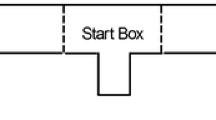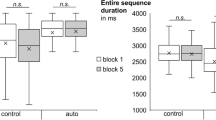Abstract
Four groups of six male social drinkers learned a motor skill task and then drank the same dose of ethanol (0.62 g/kg) during each of five drinking sessions. Sessions 1 and 5 provided pre- and posttreatment measures of ethanol effects on task performance. During treatment sessions 2 to 4, two groups mentally rehearsed (MR) the task after drinking, either in the same test environment (MRSE) or in an entirely different environment resembling a library (MRDE). The other two groups received no MR after consuming ethanol, and simply performed an auditory detection task, either in the same test room (NMRSE) or in the different room (NMRDE). Posttreatment impairment of task performance under ethanol revealed significant main effects of mental rehearsal (P=0.04) and environment (P=0.04). The MRSE group was least impaired (i.e., most tolerant), and the NMRDE group was most impaired. Thus, repeated mental rehearsal and repeated exposure to the same test environment under ethanol each facilitated behavioral tolerance to ethanol.
Similar content being viewed by others
References
Beirness DJ, Vogel-Sprott M (1984) Alcohol tolerance in social drinkers: Operant and classical conditioning effects. Psychopharmacology 84:393–397
Chen CS (1979) Acquisition of behavioural tolerance to ethanol as a function of reinforced practice in rats. Psychopharmacology 63:285–288
Crowell CR, Hinson RE, Siegel S (1981) The role of conditional drug responses in tolerance to the hypothermic effects of ethanol. Psychopharmacology 73:51–54
Dafters R, Anderson G (1982) Conditioned tolerance to the tachycardia effect of ethanol in humans. Psychopharmacology 78:365–367
Eikelboom R, Stewart J (1982) Conditioning of drug-induced physiological responses. Psychol Rev 89:507–528
Hinson RE, Siegel S (1982) The contribution of Pavlovian conditioning to ethanol tolerance and dependence. In Rigter E, Crabbe R (eds) Alcohol tolerance and dependence. Elsevier North-Holland Biomedical Press, Amsterdam, pp 179–197
Kalant H, LeBlanc AE, Gibbins RJ (1971) Tolerance to, and dependence on, some non-opiate psychotropic drugs. Pharmacol Rev 23:135–191
Lê AD, Poulos CX, Cappell H (1979) Conditional tolerance to the hypothermic effect of alcohol. Science 206:1109–1110
Lighfoot LO (1980) Behavioural tolerance to low doses of alcohol in social drinkers. Unpublished doctoral dissertation, University of Waterloo, Waterloo, Ontario
Mann RE, Vogel-Sprott M (1981) Control of alcohol tolerance by reinforcement in non-alcoholics. Psychopharmacology 75:315–320
Mansfield JG, Cunningham CL (1980) Conditioning and extinction of tolerance to the hypothermic effect of ethanol in rats. J Comp Physiol Psychol 94:962–969
Mansfield JG, Benedict RS, Woods SC (1983) Response specificity of behaviourally augmented tolerance to ethanol supports a learning interpretation. Psychopharmacology 79:94–98
Siegel S (1983) Classical conditioning, drug tolerance and drug dependence. In: Israel Y, Glaser FB, Kalant H, Popham RE, Schmidt W, Smart R (eds) Research advances in alcohol and drug problems (vol 7), Plenum, New York, pp 207–246
Solomon RL (1977) An opponent-process theory of acquired motivation: The affective dynamics of addiction. In Maser JD, Seligman M (eds) Psychophathology: Experimental models. Freeman, San Francisco, pp 66–103
Vogel-Sprott M, Rawana E, Webster RG (1984) Mental rehearsal facilitates ethanol tolerance. Pharmacol Biochem Behav 21:329–331
Wenger JR, Tiffany TF, Bombardier C, Nicholls K, Woods SC (1981) Ethanol tolerance in the rat is learned. Science 213:575–577
Author information
Authors and Affiliations
Rights and permissions
About this article
Cite this article
Annear, W.C., Vogel-Sprott, M. Mental rehearsal and classical conditioning contribute to ethanol tolerance in humans. Psychopharmacology 87, 90–93 (1985). https://doi.org/10.1007/BF00431785
Received:
Accepted:
Issue Date:
DOI: https://doi.org/10.1007/BF00431785




